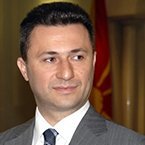
CCat82 - stock.adobe.com
The Macedonian surveillance scandal that brought down a government
Macedonia has been accused of using surveillance technology for covert spying - the subsequent political protests were instrumental in the ruling party losing power after 10 years
Since 2015, the small Balkan country of Macedonia has been engulfed in a political crisis that has only just reached a resolution.
At its centre is a scandal caused by the discovery of hundreds of thousands of illegally wiretapped communications, which has significantly dented the popularity of the country’s largest right-wing party – VMRO-DPMNE – and eventually ended its 10-year reign of power.
Evidence has emerged that Macedonia may also been running covert internet surveillance using sophisticated software supplied by a western technology company. It shows how western firms can be complicit with authoritarian governments in democratising countries.
The Macedonian Administration for Security and Counterintelligence (UBK) and senior government ministers were implicated in illegal telephone surveillance on a massive scale. The targets include journalists, non-government organisations (NGOs) and politicians from all parties.
A Special Prosecution Office (SJO), created at the instigation of the European Union, is examining the involvement of high-profile figures in illegal telephone surveillance. At the time the wiretapping scandal broke, the chief of the secret police was Saso Mijalkov, a cousin of the former prime minister and leader of VMRO-DPMNE, Nikola Gruevski.
The SJO, which was established by the EU-mediated Pržino Agreement in the summer of 2015, has the mandate to investigate crimes that were exposed in 560,646 leaked telephone conversations, often involving senior government officials.
Over a dozen investigations have been opened, on topics ranging from government-instigated violence against demonstrators, to the destruction of surveillance equipment, and to financial crime with heavily damaging consequences to the state budget.
Investigating the surveillance scandal
Between 2008 and 2015, the Administration for Security and Counterintelligence is alleged to have illegally intercepted the conversations from 5,827 phone numbers for a total of over 20,000 individuals.
Some of the leaked tapes were made public by Zoran Zaev, leader of the centre-left party SDSM, from February 2015. The wiretapped conversations – some of which can be heard here – expose serious corruption and point to instances of electoral fraud, among other crimes.
Former prime minister Gruevski is implicated in a case centering on the instigation of violence over local officers of the municipality of Centar, including mayor Andrej Zernovski. In a leaked recording, Gruevski is heard asking the former minister of transport and communication, Mile Janakieski, to arrange for someone to hit Zernovski in front of the cameras.
The former prime minister also forms part of an ongoing investigation into the demolition of a new residential complex owned by businessman Fijat Canoski. One of the latest cases opened by the Special Prosecution Office is investigating allegations of illegal funding of the party VMRO-DPMNE.
VMRO-DPMNE’s spokesman failed to respond to repeated requests for comment by Computer Weekly.
Equipment procurement through a UK firm and death of a key witness
Surveillance in Macedonia goes deeper than wiretapping. It emerged from research published by the University of Toronto in late 2015 that Macedonia is one of 32 countries to deploy the highly intrusive spying software FinFisher.
FinFisher is a sophisticated and easy-to-use set of spying tools that is sold only to governments. The FinFisher website claims that the suite “provides a unique portfolio in the field of IT investigation, to address modern challenges with the utmost efficiency with leading offensive IT intrusion solutions”. The company marketed itself with commercials that were shared by WikiLeaks.
Experts state that the program can infect computers, hack into emails and take control of systems remotely – including turning on cameras and microphones to record conversations.
Damian Georgievski, founder of Sloboden Software Macedonia, argues that FinFisher is much more dangerous than phone tapping.
“While placing or receiving phone calls is an active endeavour, once you have [this software] installed on your PC you basically no longer have control over your device. The worst is that it lets [the agent/attacker] download documents from your computer, and also upload them to it.”
The FinFisher software is produced by Gamma Group, which has offices in the UK and Germany but appears to be linked to companies in several other countries.
In 2011, The Guardian reported that Gamma Group offered to sell its FinFisher spying equipment to the Egyptian security services. The group, it has been alleged, may be making use of offshore secrecy to handle some of its deals. Gamma denied supplying equipment to Egypt.
Questions surround the role of the company’s owner, Louthean Nelson, a businessman with addresses in the UK and Lebanon who directs or controls a number of companies believed to be linked to the Gamma Group. His spokesman has stated that a British Virgin Islands offshore entity linked to Nelson is not involved in selling the FinFisher spyware, but failed to provide an explanation for the entity’s purpose.
Senior officers of the Macedonian UBK made a trip to London in 2010, and reportedly agreed the purchase of surveillance equipment from the British company Gamma International, part of the Gamma Group. The company failed to respond to Computer Weekly’s requests for comment.
Macedonia’s acquisition of surveillance technology appears to be also tainted by corruption. According to the Special Prosecution Office, procurement transactions cost the public purse over €860,000.
The Macedonian surveillance scandal
Who was responsible?
Audio tapes released by the Macedonian opposition party, SDSM, show widespread illegal surveillance by the Macedonian Administration for Security and Counterintelligence (UBK). The quality and scale of the recordings mean they could only have been made inside the national intelligence service’s facilities.
Who was monitored?
Those under surveillance included government ministers, senior public officials, mayors, MPs, the speaker of Parliament, civil servants, editors, journalists and media owners.
What did the tapes reveal?
The recordings indicate unlawful activities and abuse of power by senior government officials. The head of the intelligence services and two senior government ministers resigned soon after the tapes were exposed in January 2015.
How did surveillance work?
The three Macedonian national telecommunications providers equipped the UBK with the technical equipment to mirror their entire operational centres. The UBK was able to intercept communications directly, autonomously and unimpeded, regardless of whether a court order had or had not been issued in accordance with the Law on Interception of Communications.
Source: The former Yugoslav Republic of Macedonia: Recommendations of the Senior Experts’ Group on systemic Rule of Law issues relating to the communications
The UBK acquired the equipment through the Macedonian company Finzi Dooel Ltd, which has marked up the price of the final transaction.
The roles of former secret police chief Saso Mijalkov, former senior secret police officials Goran Grujevski and Toni Jakimovski, and interior ministry advisor Nebojsa Stajkovic form part of ongoing investigations, the SJO has confirmed to Computer Weekly.
“From the evidence obtained for this case, these funds were taken from the budget and were used for personal gain and greed,” said prosecutor Fatime Fetai at a press conference in September 2016.
The allegations form part of a financial crime investigation, codenamed Vault, which started in September 2016. Finzi’s manager, Kosta Kopač, had agreed to collaborate with the Special Prosecution Office, but committed suicide in April 2016. The circumstances of his death are surrounded by controversy.
Special prosecutor Lence Ristovska informs Computer Weekly that the name of a British company involved in the “Vault” (Trezor) case is known to the SJO, and that it is in touch with the British authorities about it, but will not disclose the name of the company at this stage.
Political backlash
The surveillance scandal became a political crisis. The publication of intercepted phone calls triggered widespread demonstrations that started in early 2015, taking aim at the wider corruption problems engulfing the country.
The political unrest accelerated in April 2016, when the country’s president, Gjorgje Ivanov, issued a blanket pardon to members of the political establishment who faced corruption allegations in the wake of the leaked telephone taps.
The pardon was subsequently withdrawn, though it did hold up the work of the Special Prosecution Office by two months, says prosecutor Lence Ristovska.
In the December 2016 elections, voters punished the governing coalition, formed by VMRO-DPMNE and the Albanian ethnic party DUI (Democratic Union for Integration), for their alleged role in the telephone and internet surveillance scandal.
 By Ристе Павлоски
By Ристе Павлоски
In a leaked recording, former prime minister Nikola Gruevski (pictured) is heard asking the former minister of transport and communication, Mile Janakieski, to arrange for someone to hit mayor Andrej Zernovski. He is also part of an ongoing investigation into the demolition of a new residential complex owned by businessman Fijat Canoski
As VMRO-DPMNE lost support at the ballot box, it has proved impossible to form a government. Its former ethnic Albanian coalition partners have shown little enthusiasm for joining a VMRO-DPMNE coalition.
After VMRO-DPMNE failed to collect enough MPs to form a governing coalition, the Albanian parties struck a deal with Zoran Zaev’s Socialists – which was strongly opposed by the incumbent party on the grounds that a so-called Tirana Platform formed by the Albanian parties was allegedly endangering the country’s territorial integrity.
“This ethnicisation of the crisis – pitting ethnic Macedonians against ethnic Albanians – is indicative of the unwillingness of the incumbent elite to concede power and it is a harbinger of trouble,” Dimitar Bechev, a non-resident senior fellow at the Atlantic Council, noted at the time.
In April, VMRO-DPMNE supporters violently stormed Parliament to oppose government formation. The shock of seeing blood spilled in Parliament proved to be the last straw for the president, who finally approved the coalition government led by Zoran Zaev. More than six months after the election, a new government was formed in late May 2017.
The investigations into the surveillance scandal continue.











